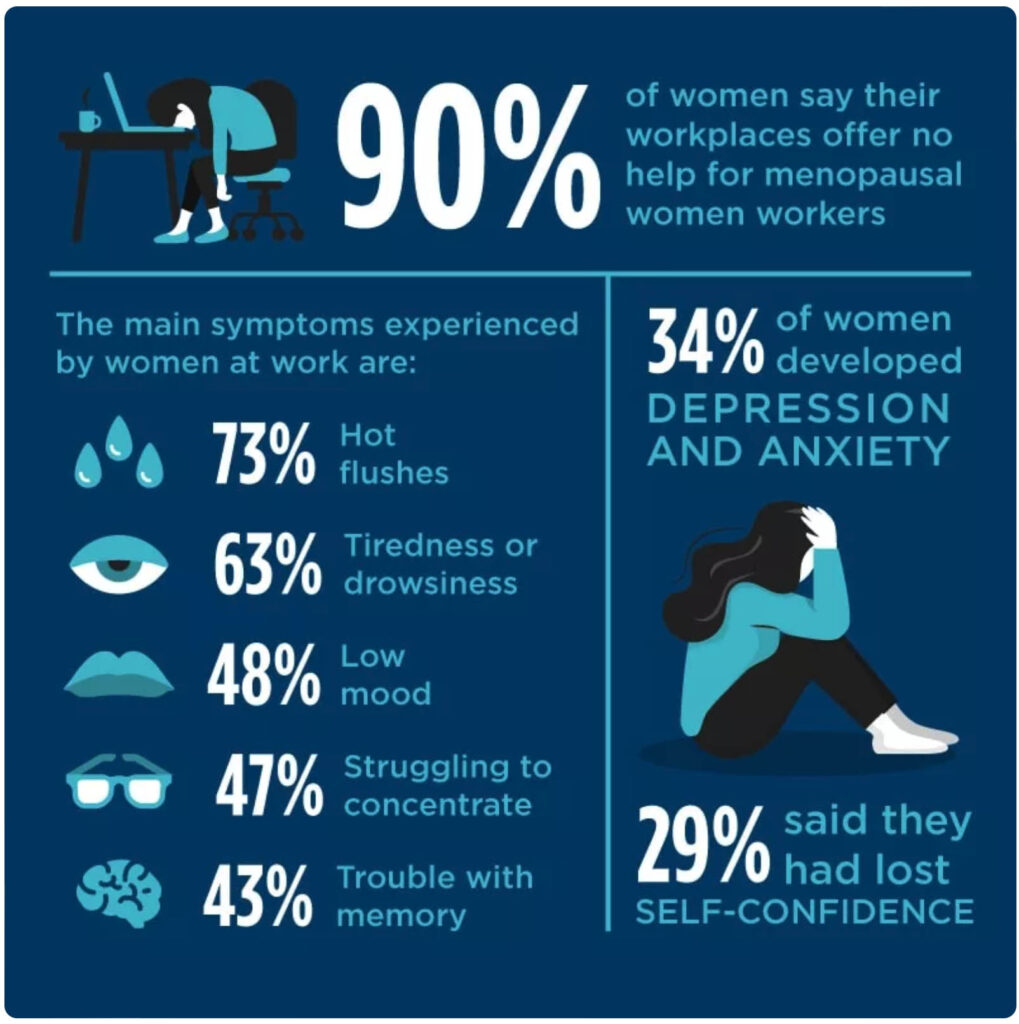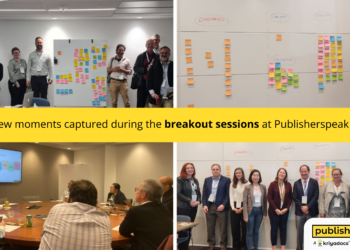Editor’s Note: This insightful post has been penned by an anonymous list of authors, reflecting the strides we’ve made in our comprehension of the evolution in women’s healthcare and our deepening understanding of ageism. It’s no secret that our industry is not immune to the pervasive issues of sexism and ageism. However, articles such as this one serve as catalysts, propelling forward dialogues and initiatives aimed at expanding our consciousness of these matters.
The primary goal of this piece is to shed light on a subject that transcends gender boundaries, impacting both women and men. Menopause, a natural biological process, manifests itself in women in diverse ways and to varying extents. By fostering awareness, we can collectively work towards a more inclusive and understanding society.
Certain mental health concerns are more easily tackled in the workplace, whereas others, often concealed, are not discussed as often — such as menopause, the topic of this post. This piece is not intended to be a medical reference, but a way to begin to normalize conversations about menopause and to bring awareness of it across all five generations currently active in the workforce. This topic affects all staff in some way, and we call on our leadership and HR professionals to lead the way in these conversations.
Some may ask why we are discussing this in The Scholarly Kitchen. It’s an important discussion to have because, according to Lee & Low’s Diversity Baseline Survey 2023, our industry is made up of “71% of cis women work in publishing as opposed to 20% cis men.” The findings are similar to those in a 2019 Statista report, where the numbers were 74% cis women versus 23% cis men. In many areas, women make up the majority of staff in publishing houses and lead many needed initiatives (although there is still work to be done to increase the gender balance in our leadership). Considering these numbers, organizations should be adopting policies to support staff dealing with menopause.
Menopause in working women aged around 45-60 is a fact of life and can have pronounced effects on mental health, as can perimenopause, which can begin in a woman’s thirties but most often affects those aged 40-44. Thirty-eight percent of women in late perimenopause (onset) experience mood changes such as depression, irritability, mental fatigue, high anxiety, anger, low self-esteem, or even feelings of being overwhelmed by life. According to the North American Menopause Society, “women appear to be particularly vulnerable to depression during the perimenopause years and in the years immediately after menopause.“ During the menopausal stage, the incidence of depression is more prevalent for those who have never experienced it before.
There are more than 30 symptoms of menopause. Moods can change from day to day, while physical ramifications such as memory or concentration loss (brain fog) have direct impacts on work performance, further compromising a healthy sense of self. During this time, women miss workdays more often, which may erode performance and professional self-confidence in the prime of their careers.
Fortunately, there are coping strategies. Taking a break when negativity or physical symptoms take over can alleviate some of the pressure to perform at the highest level all day. Other options include gentle yoga, mindfulness breathing, massage therapy, or conversing with coworkers and friends. Some find prescription antidepressants and psychotherapy helpful, as well as hormone replacement therapy.

Testimonial 1
My mom went through menopause when I was in high school. For more than three years, it completely changed how she functioned both at home and at work. She was tired and moody more frequently, had to change pajamas and sheets throughout the night because of night sweats, and gained weight in her midsection. She always felt self-conscious about her weight and appearance after that. It didn’t help that she went through menopause sooner than her friends. There were a few supplements she used to manage her symptoms, but mostly, she had to wait it out for things to improve.
Testimonial 2
I went through menopause in my late 40s, and at that time I was at the peak of my career. I held the role of senior leadership executive for a nonprofit organization. The symptoms of menopause were so severe that I often could not work. On days that I was in the office, I would fear going to in-person meetings because of my considerable sweating that would overtake me without warning. I am an intelligent, highly motivated executive but suddenly found that I could not remember basic work information. In addition, I often became angry at staff and colleagues without justified explanation and broke out into tears over insignificant matters. It was so complicated for me to explain at work what was happening to me.
In many instances, it was even more embarrassing when I would experience these symptoms around my male colleagues. They would not always understand and expressed that I was losing my mind. Some made hurtful comments to me. One young man said in a low voice that I needed a psychiatrist and was not fit to be in the workplace. Although much information can now be found to educate people on these health issues, being sensitive and aware are the initial steps.
Increasing healthcare options are now available. Women have the options of trying different medications and therapy, as well as new devices, which are available to measure signs and stages of menopause. It is crucial to spotlight these health issues in the workplace so all can be made aware of the severity and see this as an illness that if treated properly, women can get help. But mostly, show compassion and understanding.
Finally, I resigned from my executive position and started my own small business where I did not have to deal with the social embarrassment of menopause and its symptoms.
Testimonial 3
When I was going through menopause, I was in my 40s and a single parent with a child in elementary school. I want to tell you it was difficult managing menopause while also being a leader in my industry and community. I remember excruciating migraines prior to the sudden drop in my hormonal levels at the beginning of my cycle. Leading up to the start of my period, the migraines were so bad that I could barely get to work and pick my child up from school. After dinner, I’d prop my child up in bed next to me and allow the television to babysit. I hid under my covers, took many medications to help with the pain that was searing through my brain and hoped I’d be able to function the next day.
I eventually found a doctor who worked specifically with migraine sufferers and I learned what my triggers were. I would have to take a day off from work if the meds didn’t work but I still had to be a mother.
My doctor wasn’t local, and the expense of travel was not covered by anyone but myself. Those were many challenging days and my manager at work was quite difficult. At the time, it was not acceptable for a woman to take time off due to “female problems.” I managed to persevere through my earliest days of discomfort. I never ever once told my company that I was going through “the change.” I just remember suffering a lot and keeping quiet. I don’t think I talked with anyone about what was going on other than my doctor. It was taboo to speak of this in the late 1990s. Today, women are more open about mental health issues. We are much better off in our understanding that health issues, whether physical or mental, are all health issues and we should not be ashamed to talk about them. And, it is not too much to expect support from their employer and colleagues.
Testimonial 4
I’ve been in meetings with sweat dripping down my back because of those devil hot flashes! I couldn’t do anything about it and suffered through hoping no one would notice. I do remember someone asking if I felt faint. My response was that I needed a few minutes. After a while, I started keeping a piece of paper close by to fan myself with.
Testimonial 5:
No one used to talk about this and there was a lot of quiet suffering at home and at work. I’m glad people are talking about it now. I’m not suffering as much as my friends. I’m in my late 40s but I don’t know how to get through the day. The tiredness, forgetfulness, etc. is a lot for anyone.
Testimonial 6:
A myriad of things happens to women during menopause, which result in some women having to carry with them a change of undergarments. “You cough, you sneeze…it all comes out.” The more you know!
————————
Menopause has carried a stigma at work and many women still feel uncomfortable admitting to such a personal condition. Historically, women have also experienced ageism, racism, and sexism because of how they need to adjust their work life to accommodate this change. For many women of color, menopause is an added burden because they are expected to perform at a higher level than their non-BIPOC counterparts and studies show that menopause may occur earlier for women of color due to “weathering.”
For some, menopause is more manageable in the remote work environment, where they are better able to control the room temperature, what they wear, and can watch their diet more effectively. The ability to turn off the camera when a hot flash or other physical symptom occurs is a bonus.
However, when one must manage menopause at work, having a supportive network allows women to do their best work and understand that this is a health issue that not only affects women physically but also mentally.Let this post be a bold call to leadership and HR professionals to understand what women are going through, to share information on the many phases of menopause as it affects all staff in different ways, and to provide a standard, procedural level of support (for example, quiet rooms in the building). Given that around 20% of the U.S. workforce is in some degree of menopause transition, it is encouraging to see that organizational change is happening, and the stigma is lifting. Now, let’s normalize the way we talk about it in the workplace and not simply rely on women to lead the way.
Additional Resources
International Menopause Society: World Menopause Day
NAMS. The Menopause Guidebook. 9th ed.
https://www.menopause.org/publications/consumer-publications
The BMJ: Normalising Menopause
https://www.bmj.com/content/377/bmj-2021-069369
Discussion
12 Thoughts on "Mental Health Awareness Mondays: The Menopausal Effect on the Workforce"
Thank you for exploring this topic and its impact on women’s working and personal lives. Menopause is different for every woman, and all deserve compassion, understanding, healthcare, and other resources. I was “lucky” enough to have experienced four different levels of menopause in my 50s: perimenopause, natural menopause, menopause after total hysterectomy, and menopause after cancer treatment with antiestrogens. The first and the fourth were the most disruptive to my life. That said, I was fortunate to have a flexible employer and to have been healthy before all of this; my heart goes out to women for whom poor treatment in the workplace, preexisting health conditions, and a history of microaggressions further complicate this time of their lives.
Thank you for writing about perimenopause and menopause in the context of the professional environment. I’m part of the generation where we’re normalizing the conversation about perimenopause and menopause as it has a major physical and mental impact on some of us. The most frustrating part about this stage of life is sometimes you have to slow down and can’t always be running around in “overachiever” mode. However, does that really make it that something is “wrong” with us? No, it doesn’t, it’s another stage of life. We’ve moved away from paying attention from our mind and bodies. It’s time to come back to the beginning and learn how to respect our minds and bodies again. The world will not burn if we need to answer a few less emails or attend a few less meetings when we have to.
Menopause came in my late 40 into my early 50’s. The hardest things were the plummet in energy and the depression. An environment of more, faster, better only fed the fatigue and bad feelings.
Glad to see people are starting to acknowledge the impact that this profound change has on a significant percentage of the work force.
Thank you for covering such an important topic in TSK and how it impacts women across the scholarly communications community. As you said menopause and perimenopause affects not just women, but men too either via work colleagues or personally at home. There are so many symptoms to be aware of – just being kind and making a few allowances may make all the difference to a female colleague who is struggling.
For all the women struggling out there, check out bioTE. It’s made a world of difference for me. I still forget things, but the hot flashes are gone, the fatigue is less, and my mood is stable.
Lest readers conclude that every woman has a difficult time with menopause, let me summarize my experience: Reaching menopause was a huge relief. I felt like the cloud that had hung over my head throughout my reproductive years was lifted and I could finally return to being myself. No longer did I have to worry about unwanted pregnancies. No longer did I contend with cramps and other menstrual symptoms. My menopausal symptoms were mild and not at all distressing; as someone who has always tended to be cold, I found the occasional hot flash a welcome change. My energy level, which has always been high, became even higher after menopause, and I am glad to need less sleep. I have great sympathy with women who have a miserable menopause, but I want to note that not all of us have such an experience. Quite likely, those of us who find menopause a neutral or positive transition tend not to talk about it. I hope that many women have experiences of menopause akin to mine.
Thank you for centering this critical but so often ignored issue. As the comments above demonstrate, women have very different experiences of menopause, but 85% of us will experience at least some symptoms, all of which are intrusive but usually invisible. Other countries have done a MUCH better job than the US with normalizing this discussion in the workplace and given the gender balance in our industry, it’s refreshing to at last see menopause being named and discussed here. There are more resources out there now but still a lot of misunderstanding (especially about hormone treatments) and nowhere near enough research (just imagine how many research $ would have been devoted to it if men went through anything like these symptoms for 4-5 years of their lives). I hope that organizational leaders will take your cue and both normalize discussion and support all of those who are struggling.
I’m so glad to see this being discussed here on SK: I worked in publishing for decades before starting my business (www.managingthemenopause.com) and now support wonderful organizations that ‘get it’ and want to train their managers and educate all colleagues on the topic, to normalize these conversations – I’d be happy to chat to more companies that want to get this right!
Thank you for breaking the silence on this SK! The struggle is real.
The key to Overcome is to Understand.
For those in our community who read German, I highly recommend the breakthrough book ‘Women on Fire’ by Dr. Sheila de Liz (ISBN-13: 978-3-499-00317-2). The author’s metaphoric writing style makes these concise 288 pages equally informative and entertaining, i.e., embodying progesterone, estrogen and testosterone as Charlie’s Angels.
There are no translations of the title to date, but English translation rights were sold to Beijing Science and Technology Press. Other translation projects include Greek – Klidarithmos, Korean – Eunhaengnamu, Russian – AST and Serbian – Laguna.
Knowledge is Power!
Frankly, I’m surprised and disappointed menopause is not more openly discussed. Men’s reproductive issues — some of which are also related to the aging process — have taken center stage since the ’90s. There’s no shame in that. We need to do better.
For anyone looking for additional reading – I’m a premenopausal woman (in my early 40s) who felt pretty clueless about what I might experience in the future, and I found the book “What Fresh Hell Is This?” by Heather Corinna to be a great introduction to many different aspects of the perimenopausal and menopausal experience, from mental to physical to social. Corinna (who is nonbinary and uses they/them pronouns) talks about their own experiences but also about the state of scientific research as of the time the book was written, and also includes personal anecdotes from other people who are going through or have gone through perimenopause and menopause.
Heather’s book is brilliant – great shout! I interviewed Heather a while ago about their book: https://middlingalong.com/episodes/middling-along-8-heather-corinna-on-hellish-peri-symptoms-and-their-new-book-what-fresh-hell-is-this/

